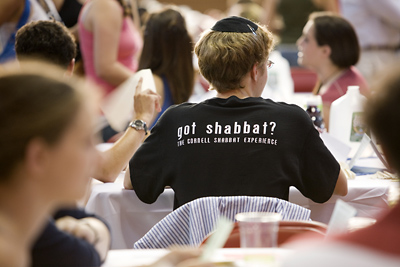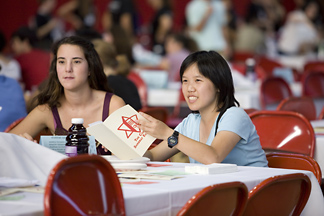More than 1,000 share eco-friendly Shabbat dinner
By Jamie Smith



More than 1,000 members of the Cornell and Ithaca communities sat down to a free, environmentally friendly Shabbat dinner in Barton Hall, Sept. 7, in an atmosphere of multicultural inclusiveness, complete with Jewish food and "Axis of Evil" comedy by Ahmed Ahmed, sponsored by the Iranian Students Organization.
The fourth annual Shabbat 1000, sponsored by Cornell Hillel and made possible with support from Cheryl and David Einhorn, both Class of '91, and the Einhorn Family Charitable Trust, put great emphasis not only on cooperation among people from different backgrounds but also on environmental consciousness. For the first time, all the cups, plates and silverware used were compostable, and information was distributed on how to be greener at home, including tips like unplugging electronics when they are not in use (some electronics use electricity even when turned off) and using compact fluorescent light bulbs over incandescent bulbs.
All Hillel programs this year will be environmentally friendly to be more socially conscious and to emphasize two major tenants of Judaism: tzedek, or social justice, and tikkun olam, repairing the world, said Rabbi Ed Rosenthal, executive director of Hillel.
"We have big programs. ... we create a lot of waste," said Rosenthal. "The programs have to have a substance beyond."
Rosenthal told the crowd why Hillel sponsors Shabbat 1000: "First of all, it's Shabbat; it's what we do! Second -- everyone can see the vibrant energy that is the Jewish community, and we can share it with the non-Jewish community."
Attendees were also encouraged to make Shabbat -- a weekly Jewish observance to welcome the Sabbath, the day of rest -- at home. Pamphlets on the tables explained Shabbat as "separating yourself from the rest of the busy week" and "spending time with friends and family."
The dinner was preceded with a nigun (Hebrew song), the traditional "Shalom Aleichem," a lighting of the Shabbat candles and the Kiddush, a blessing using wine (or in this case, grape juice) to sanctify the Shabbat. The diners then enjoyed the meal of grape juice, challah (traditional braided bread), stuffed cabbage, chicken, salad and kugel, a traditional Jewish dessert.
"When you look around, it's not completely people from a Jewish background," noted Brian Clapp, a junior in the College of Engineering. "There are people from all nationalities. ... It shows the open-mindedness of the Jewish community."
Jamie Smith '09 is a writer intern at the Cornell Chronicle.
Media Contact
Get Cornell news delivered right to your inbox.
Subscribe